On July 13, the Department of Justice charged four Iranians – one intelligence official and three “intelligence assets” – with conspiring to kidnap an Iranian American journalist living in Brooklyn. The four men were charged with conspiracy to kidnap, violating U.S. sanctions on Iran, money laundering and bank and wire fraud. They faced a lifetime in prison, if convicted on all charges. The indictment, unsealed in a New York federal court, identified the conspirators by name:
- Alireza Shavaroghi Farahani (aka Vezerat Salimi or Haj Ali), age 50, is an intelligence official living in Iran. He manages a spy network and oversaw the operation.
- Mahmoud Khazein, age 42, is an “intelligence asset” working under Farahani and living in Iran. He is the chief executive of a consortium that imports marine, construction and agricultural equipment for the government. He previously advised the intelligence ministry and was appointed to a position in the Basij, the student wing of the Revolutionary Guards.
- Kiya Sadeghi, age 35, is an “intelligence asset” working under Farahani and living in Iran. He falsely claimed to work for a company in Dubai and oversaw surveillance of the journalist.
- Omid Noori, age 45, is an “intelligence asset” working under Farahani and living in Iran. He reviewed surveillance footage of the journalist.
The indictment also named a female accomplice: Niloufar Bahadorifar (aka Nellie Bahadorifar), age 46, who allegedly “provided financial services” to the plotters while living in California. She was arrested on July 1 and arraigned before a federal judge on July 8. Bahadorifar was charged with violating U.S. sanctions on Iran, money laundering, and bank and wire fraud. The four other Iranians “remain at large,” the U.S. Attorney’s Office for the Southern District of New York said in a statement on July 13. Bahadorifar was sentenced to four years in prison on April 7, 2023.

The Justice Department did not identify the Iranian American journalist. But Masih Alinejad – a Voice of America contractor and fierce critic of Iran’s compulsory dress code – told The New York Times that she was the intended kidnapping target. Federal authorities had already moved her to a safe house several months ago, The Wall Street Journal reported.
Alinejad, who was born in Iran, fled the country in 2009 after writing articles critical of then-President Mahmoud Ahmadinejad. She lived in the United Kingdom for five years before obtaining a green card in 2014. She became a U.S. citizen in October 2019. Alinejad runs a Facebook page “My Stealthy Freedom,” where she posts videos of Iranian women filming themselves without the mandatory hijab, or head covering, in public. In August 2020, Iranian hardliners urged the intelligence services to abduct Alinejad and bring her back to Iran.
The four indicted Iranians plotted to bring Alinejad to Iran, either by luring her abroad or forcibly renditioning her by sea to a third country. In 2018, Iranian government officials contacted Alinejad’s relatives and asked them to invite her to a third country where she would be “arrested or detained and transported to Iran for imprisonment,” the Justice Department said. Her relatives refused the offer. The kidnappers later researched services for “military-style speedboats” to rendition Alinejad from New York to Venezuela. “This is not some far-fetched movie plot,” FBI Assistant Director William F. Sweeney Jr. said in a statement. “FBI special agents and analysts will continue to aggressively hunt for foreign operatives who attempt illegal action inside our borders or against our citizens.”
Greatly disturbed by Iran's alleged plot to kidnap a U.S. citizen. We strongly condemn Iran's continued attempts at kidnapping journalists and critics of the regime in order to silence dissent.
— Special Envoy for Iran Robert Malley (@USEnvoyIran) July 14, 2021
In 2020 and 2021, the Iranians used private investigators to “surveil, photograph and video record” Alinejad and others living in her household, the Justice Department said. Sadeghi was the main contact with the private investigators, while Noori “facilitated payment” with money laundered into the United States from Iran. “When [the FBI] showed me the photos of my private life with my husband, my stepchildren, my beautiful garden in Brooklyn, I was like, wow,” Alinejad told CNN in an interview after the charges were unsealed. “Then I took it [seriously]. They sent me to the safe house, and I'm being under FBI protection until now.”
Iran’s foreign ministry called the charges “ridiculous and baseless” and derided them as a “Hollywood scenario.” But Tehran has previously lured dissidents abroad for kidnapping. “For decades Iranian authorities have deployed vicious tactics to harass, intimidate, and harm Iranian activists living abroad,” Michael Page, deputy Middle East director at Human Rights Watch, said on July 14. “Iran’s security agencies have now allegedly attempted to kidnap another high-profile dissident to dragoon back to Iran and face serious abuses.”
Thank you for the outpouring of support from friends and followers.
— Masih Alinejad 🏳️ (@AlinejadMasih) July 14, 2021
By attempting to kidnap me, the Islamic Republic of Iran wanted to silence me. But I'm not scared. As long as I'm alive, I'll keep being a voice for Iran's mourning mothers, women, minorities and dissidents.
In 2019, Iranian operatives lured Ruhollah Zam – a France-based journalist who spread information about anti-government protests in 2017 on social media – to Iraq. He was arrested by the Revolutionary Guards and brought to Iran. In December 2020, Iran executed Zam for espionage. In July 2020, Iran detained Jamshid Sharmahd, the leader of a small Iranian opposition group named the “Kingdom Assembly of Iran,” while he was traveling on a business trip to India via Dubai. In October 2020, an Iranian agent lured Habib Chaab, the founder of the Ahvaz separatist movement in Iran, to Istanbul before drugging him and driving him 1,000 miles east into Iran.
Farahani, the intelligence official overseeing the operation, had photos of both Zam and Sharmad on an electronic device, the indictment alleged. Under their photos was a Persian caption: “Gradually, the gathering gets bigger… Are you coming, or should we come for you?”
Good conversation today with @AlinejadMasih, who has demonstrated tremendous courage. I affirmed that the U.S. will always support the indispensable work of independent journalists around the world. We won’t tolerate efforts to intimidate them or silence their voices.
— Secretary Antony Blinken (@SecBlinken) July 20, 2021
On July 14, State Department Spokesperson Ned Price denounced the failed kidnapping plot. “We categorically condemn this reported plot to kidnap a U.S. citizen on U.S. soil,” he said. “There should be no doubt about where this administration, including the State Department, stands.” When asked if the United States would consider imposing sanctions in response, Price said that he would not rule anything out.
On July 19, Secretary of State Antony Blinken met with Masih and pledged that the United States would "hold the regime accountable," according to Alinejad. After their meeting, Blinken expressed support for "the indispensable work of independent journalists around the world," such as Alinejad. "We won’t tolerate efforts to intimidate them or silence their voices," he tweeted. On July 23, National Security Advisor Jake Sullivan met with Alinejad and said that the United States supported her work to advance human rights. "The U.S. condemns any attempts to intimidate courageous journalists and activists like Masih," he tweeted. The following is the statement by the Justice Department announcing the indictment, remarks by Price and a readout from Sullivan's meeting with Alinejad.
Justice Department Announcement
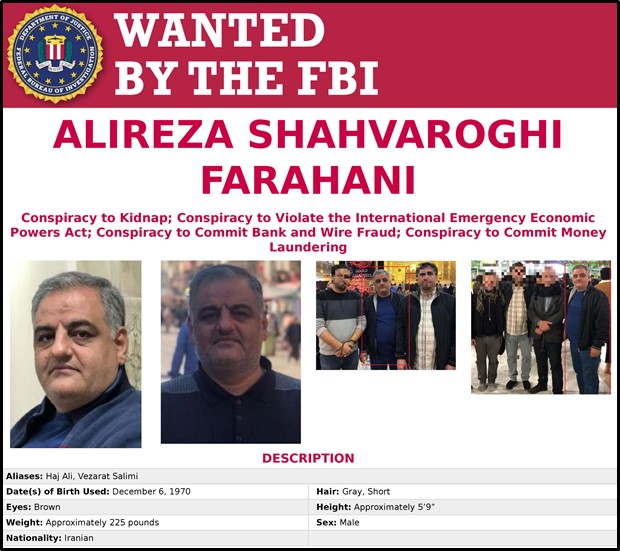 On July 13, 2021, the Justice Department released details of the Iranian plot. “A New York federal court unsealed an indictment today charging four Iranian nationals with conspiracies related to kidnapping, sanctions violations, bank and wire fraud, and money laundering. A co-conspirator and California resident, also of Iran, faces additional structuring charges.
On July 13, 2021, the Justice Department released details of the Iranian plot. “A New York federal court unsealed an indictment today charging four Iranian nationals with conspiracies related to kidnapping, sanctions violations, bank and wire fraud, and money laundering. A co-conspirator and California resident, also of Iran, faces additional structuring charges.
“According to court documents, Alireza Shavaroghi Farahani, aka Vezerat Salimi and Haj Ali, 50; Mahmoud Khazein, 42; Kiya Sadeghi, 35; and Omid Noori, 45, all of Iran, conspired to kidnap a Brooklyn journalist, author and human rights activist for mobilizing public opinion in Iran and around the world to bring about changes to the regime’s laws and practices. Niloufar Bahadorifar, aka Nellie Bahadorifar, 46, originally of Iran and currently residing in California, is alleged to have provided financial services that supported the plot.
“’Every person in the United States must be free from harassment, threats and physical harm by foreign powers,’ said Acting Assistant Attorney General Mark J. Lesko for the Justice Department’s National Security Division. ‘Through this indictment, we bring to light one such pernicious plot to harm an American citizen who was exercising their First Amendment rights, and we commit ourselves to bring the defendants to justice.’
“’As alleged, four of the defendants monitored and planned to kidnap a U.S. citizen of Iranian origin who has been critical of the regime’s autocracy, and to forcibly take their intended victim to Iran, where the victim’s fate would have been uncertain at best,’ said U.S. Attorney Audrey Strauss for the Southern District of New York. ‘Among this country’s most cherished freedoms is the right to speak one’s mind without fear of government reprisal. A U.S. citizen living in the United States must be able to advocate for human rights without being targeted by foreign intelligence operatives. Thanks to the FBI’s exposure of their alleged scheme, these defendants have failed to silence criticism by forcible abduction.’
“’As alleged in this indictment, the government of Iran directed a number of state actors to plot to kidnap a U.S.-based journalist and American citizen, and to conduct surveillance on U.S. soil - all with the intention to lure our citizen back to Iran as retaliation for their freedom of expression,’ said Assistant Director Alan E. Kohler Jr. of the FBI’s Counterintelligence Division. ‘We will use all the tools at our disposal to aggressively investigate foreign activities by operatives who conspire to kidnap a U.S. citizen just because the government of Iran didn’t approve of the victim’s criticism of the regime.’
“According to the indictment, Farahani is an Iranian intelligence official who resides in Iran. Khazein, Sadeghi and Noori are Iranian intelligence assets who also reside in Iran and work under Farahani. Since at least June 2020, Farahani and his intelligence network have plotted to kidnap a U.S. citizen of Iranian origin (Victim-1) from within the United States in furtherance of the government of Iran’s efforts to silence Victim-1’s criticisms of the regime. Victim-1 is an author and journalist who has publicized the government of Iran’s human rights abuses.
“Prior to the kidnapping plot, the government of Iran attempted to lure Victim-1 to a third country in order to capture Victim-1 for rendition to Iran. In approximately 2018, Iranian government officials attempted to induce relatives of Victim-1, who reside in Iran, to invite the victim to travel to a third country for the apparent purpose of having Victim-1 arrested or detained and transported to Iran for imprisonment. Victim-1’s relatives did not accept the offer. An electronic device used by Farahani contains, among other things, a photo of Victim-1 alongside photos of two other individuals, both of whom were lured from third countries and captured by Iranian intelligence, with one later executed and the other imprisoned in Iran, and a caption in Farsi that reads: ‘gradually the gathering gets bigger... are you coming, or should we come for you?’
“On multiple occasions in 2020 and 2021, as part of the plot to kidnap Victim-1, Farahani and his network procured the services of private investigators to surveil, photograph and video record Victim-1 and Victim-1’s household members in Brooklyn. Farahani’s network procured days’ worth of surveillance at Victim-1’s home and the surrounding area, videos and photographs of the victim’s family and associates, surveillance of the victim’s residence, and the installation of and access to a live high-definition video feed of Victim-1’s home. The network repeatedly insisted on high-quality photographs and video recordings of Victim-1 and Victim-1’s household members; a large volume of content; pictures of visitors and objects around the house; and depictions of Victim-1’s body language. The network procured the surveillance by misrepresenting their identities and the purpose of the surveillance to the investigators, and laundered money into the United States from Iran to pay for the surveillance. Sadeghi acted as the network’s primary point of contact with private investigators while Noori facilitated payment to the investigators in furtherance of the plot.
“As part of the kidnapping plot, the Farahani-led intelligence network also researched methods of transporting Victim-1 out of the United States for rendition to Iran. Sadeghi, for example, researched a service offering military-style speedboats for self-operated maritime evacuation out of New York City, and maritime travel from New York to Venezuela, a country whose de facto government has friendly relations with Iran. Khazein researched travel routes from Victim-1’s residence to a waterfront neighborhood in Brooklyn; the location of Victim-1’s residence relative to Venezuela; and the location of Victim-1’s residence relative to Tehran.
“The network that Farahani directs has also targeted victims in other countries, including victims in Canada, the United Kingdom and the United Arab Emirates, and has worked to procure similar surveillance of those victims.
“As alleged, Bahadorifar provided financial and other services from the United States to Iranian residents and entities, including to Khazein, since approximately 2015. Bahadorifar facilitated access to the U.S. financial system and institutions through the use of card accounts and offered to manage business interests in the United States on Khazein’s behalf. Among other things, Bahadorifar caused a payment to be made to a private investigator for surveillance of Victim-1 on Khazein’s behalf. While Bahadorifar is not charged with participating in the kidnapping conspiracy, she is alleged to have provided financial services that supported the plot and is charged with conspiring to violate sanctions against Iran, commit bank and wire fraud, and commit money laundering. Bahadorifar is also charged with structuring cash deposits totaling more than approximately $445,000.
“Farahani, Khazein, Sadeghi and Noori are each charged with: (1) conspiring to kidnap, which carries a maximum sentence of life in prison; (2) conspiring to violate the International Emergency Economic Powers Act (IEEPA) and sanctions against the government of Iran, which carries a maximum sentence of 20 years in prison; (3) conspiring to commit bank and wire fraud, which carries a maximum sentence of 30 years in prison; and (4) conspiring to launder money, which carries a maximum sentence of 20 years in prison. Bahadorifar is charged with counts two, three and four, and is further charged with structuring, which carries a maximum sentence of 10 years in prison. A federal district court judge will determine any sentence after considering the U.S. Sentencing Guidelines and other statutory factors.
“The FBI’s New York Field Office, Counterintelligence-Cyber Division and Iran Threat Task Force are investigating the case.
“Trial Attorney Nathan Swinton of the Justice Department’s Counterintelligence and Export Control Section and Assistant U.S. Attorneys Michael D. Lockard, Jacob H. Gutwillig and Matthew J.C. Hellman of the Southern District of New York are prosecuting the case.
“An indictment is merely an allegation, and all defendants are presumed innocent until proven guilty beyond a reasonable doubt in a court of law.”
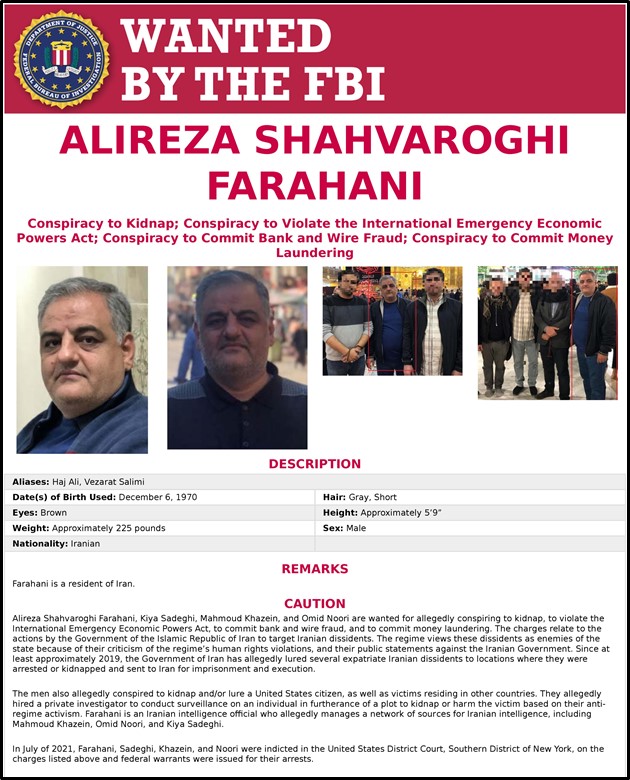
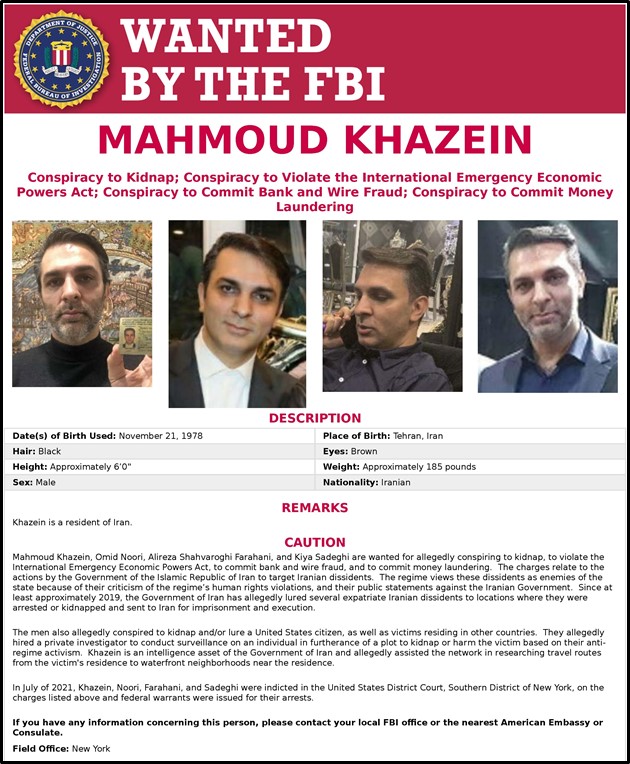
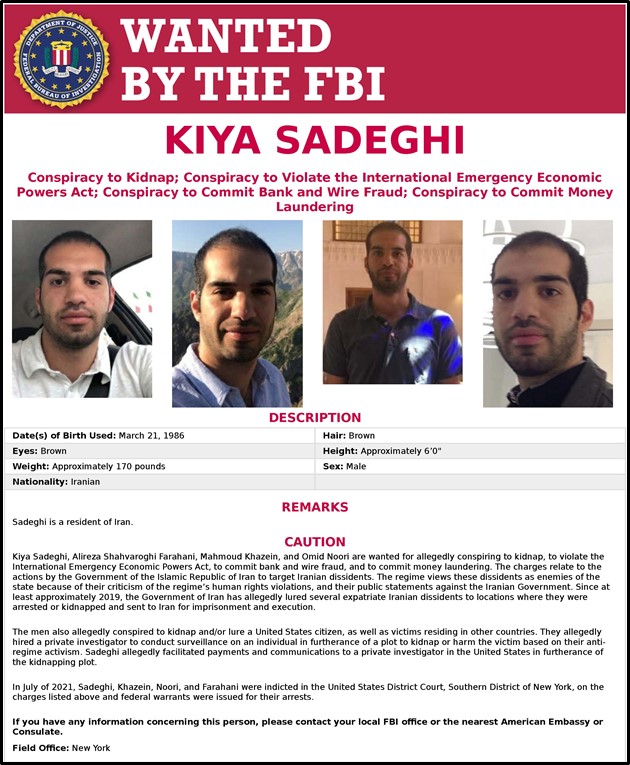
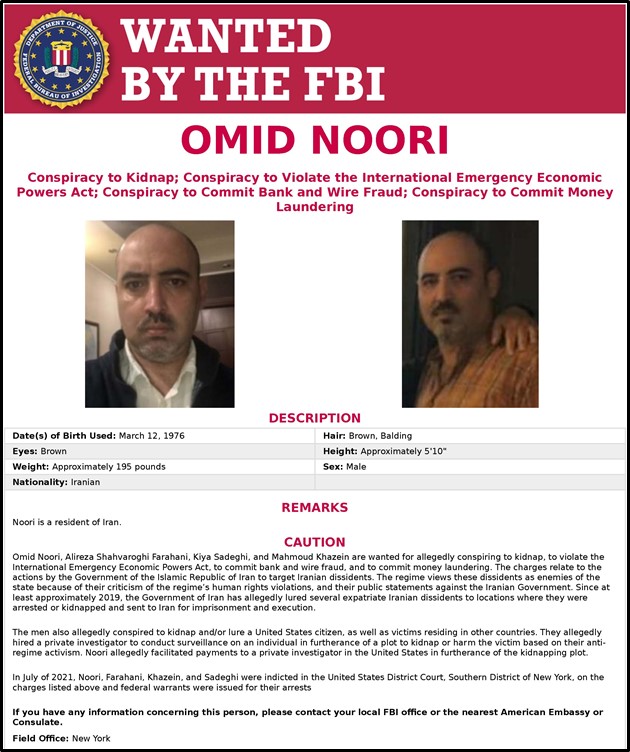
State Department Spokesperson Ned Price
Press briefing on July 14, 2021:
QUESTION: “Why are you continuing to do this [negotiate with Iran on its nuclear program] if this government has shown no inclination that it’s willing to stop this kind of malign behavior that you and the previous administration and the administration prior to that and before that too have all called out?
PRICE: “We are careful not to weigh in on the specifics of law enforcement investigations and law enforcement matters, but obviously, as you know, the Department of Justice did release quite a detailed charging document yesterday. And let me be very clear: We categorically condemn this reported plot to kidnap a U.S. citizen on U.S. soil. There should be no doubt about where this administration, including the State Department, stands.
“We will, as we have, forcefully defend U.S. citizens and U.S. interests, and that includes in the context of law enforcement actions like the one that the Department of Justice announced yesterday, as well as the actions the President has taken to defend our interests in the region from Iranian-backed militant groups. It also includes – and this is important – our ongoing diplomatic efforts to constrain Iran’s nuclear program.
“We’ve made this point before, but it is an urgent concern: Every challenge we face with Iran is made more difficult, made more intractable, when Iran’s nuclear program is uncontrolled, when it is unconstrained. The JCPOA [Joint Comprehensive Plan of Action], to be clear, when it was in full effect, was successful in permanently and verifiably preventing Iran from obtaining a nuclear weapon, and that’s why we’re seeking that return to mutual compliance.
“As the Justice Department’s actions prove, we will continue to address the other challenges that we have in our relationship with Iran or in the context of the challenges and threats that Iran poses to the region and beyond. As I said before, every single one of those is made more difficult, is more complex for us to confront, when we have the potential threat of an uncontrolled Iranian nuclear program on the horizon.
“Let me put that a slightly different way. Constraining Iran’s nuclear program by returning to the JCPOA, by seeing to it once again that Iran’s nuclear program is permanently and verifiably in a box, that will put us in a better position to address all of the other challenges that we have.
“The simple fact of the matter – and you referred to the previous administration and the one before that. But ever since the U.S. withdrew from the JCPOA, none of the challenges we have with Iran – and again, they are many – have gotten better. And in fact, most of them have gotten worse. That starts with the unconstrained activities in the nuclear program. We’ve talked a great deal about the attacks by these Iran-backed militias. DOJ has spoken to this alleged plot.
“So yes, to be clear, we intend to continue our effort to limit Iran’s nuclear program through a mutual return to compliance, just as we continue to go about actively confronting the range of threats we see from Iran, to include those that maybe targeting or in some ways implicating American citizens and American interests. We demonstrated that yesterday. The President has demonstrated it in the past. And this department will continue to demonstrate that through our principled, clear-eyed diplomacy to seek to effect a mutual return to the JCPOA.”
QUESTION: “Does there come to be a point at which the administration decides that Iran’s behavior or malign behavior or this attempted kidnapping, whatever it may be, in other areas are so egregious that it means you can no longer negotiate in good faith with them in Vienna on the nuclear issue?”
PRICE: “Well, there are two separate issues here, and one of which we’ve spoken to in recent days. As I’ve made very clear, the United States is prepared to resume indirect talks with Iran, to resume that seventh round of negotiations. We are ready to go if and when the Iranians signal they are as well. And that’s precisely because we want to see Iran’s nuclear program once again verifiably and permanently constrained and Iran permanently barred from ever obtaining a nuclear weapon.
“Now, on the question of – on that front, this process is not indefinite, as the Secretary has said, as you’ve heard me reiterate. There will come a point where our calculus will change, where the gains that Iran is able to make in its nuclear program, the benefits it accrues might one day outweigh the benefit that the international community would accrue from a mutual return to compliance with the JCPOA. We’re not there yet, but that is why we believe we should – the international community, the United States together with our closest allies and some of our partners in the form of the P5+1, should return to Vienna for these talks just as soon as we can.
“Now, there’s a broader issue that you raise that suggests that because Iran is engaging in this behavior in other realms, does that implicate our view of nuclear negotiations. Our view continues to be that every single challenge that Iran poses in the non-nuclear realm is made more difficult when Iran’s nuclear program is unconstrained, when it is potentially uncontrolled.”
QUESTION: “What more is the administration willing to do to respond to the Iranian Government because of this plot, for this plot?”
PRICE: “Well, you saw DOJ make light of this. You have seen them unveil these charges. You’ve also seen this administration make very clear that we will always take action when it’s in our interests and when it’s appropriate to do so. We have used the tools available to us, from sanctions to, in a couple cases, military force. So again, we don’t preview any steps that we may take, but we do have a pretty expansive toolkit and we have made no secret of the fact that we’re prepared to use it.”
QUESTION: “This administration launched a policy specifically for this kind of activity. The Khashoggi Ban is for counter-dissident, extraterritorial – why wouldn’t this warrant sanctions, then?”
PRICE: “I’m not ruling anything out, but you’re exactly right that we do have a number of tools at our disposal, including the Khashoggi Ban. We have just announced the Khashoggi Ban in February, I believe it was. It’s already been used in – applied in dozens of cases. But we are always reviewing cases that may implicate the Khashoggi Ban and may be appropriate to use it.”
Readout of National Security Advisor Jake Sullivan’s Meeting with Iranian-American Journalist and Activist Masih Alinejad
National Security Advisor Jake Sullivan met today with Iranian-American journalist and activist Masih Alinejad and her husband Kambiz Foroohar. During the meeting, Mr. Sullivan expressed concern for Ms. Alinejad’s family and colleagues who are detained in Iran. He affirmed the U.S. Government’s strong continued support for Ms. Alinejad’s work to advance universal human rights, particularly her tireless efforts on behalf of women, the Iranian people, and all those unjustly detained by the Iranian government. Mr. Sullivan noted with concern the growing practice of authoritarian regimes such as Iran targeting dissidents, activists, and journalists across international borders, including within the United States. The U.S. Government will continue to strenuously oppose these illegal actions, which violate human rights and threaten the rules-based international order.
Honored to meet @AlinejadMasih today. I was moved by her bravery and undaunted advocacy on behalf of the Iranian people, especially women and those unjustly detained in Iran. The U.S. condemns any attempts to intimidate courageous journalists and activists like Masih. pic.twitter.com/hHusOJgUqe
— Jake Sullivan (@JakeSullivan46) July 23, 2021
